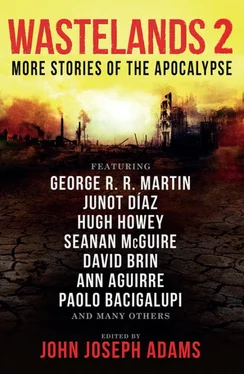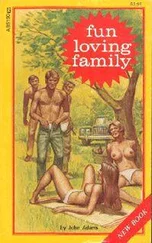“Do you love me?” you ask him. It’s bullshit to hear yourself. Your voice sounds wobbly. You sound like what you never were.
“I gave you my teeth,” he says, but he doesn’t say he loves you. You are now plastic in a world where no one needs anything but metal.
You don’t say you love him, either. You met during an apocalypse. What kind of fool are you?
“What are your teeth for?” you ask.
“To pay tolls,” he says and then he closes your fingers around them. You hide the teeth beneath your pillow. One morning there are coins in their place. Some old traditions, apparently, linger in the world. Or maybe you did that, to try to make him love you. You place the coins on his eyes as he sleeps, and he wakes up laughing.
“Not that kind of toll,” he says.
You aren’t laughing. You hide his teeth, in case they’re ever all that is left of him, and you have to find something to bury. You curse yourself. Even at the end of the world, you’re still trying to rig the system. You don’t want to talk about love, and so you talk about worms. You casually relate anecdotes of people who died, listing their agonies like ingredients in a complicated recipe, waiting for him to tell you he loves you, waiting for him to tell you he hopes the worms don’t get you.
Your skin, by the third year, for which the traditional gift is leather, is covered with words no one uses any longer. He’s careful. You’re careful. The blood isn’t much.
Sometimes he quotes you. “Brother, I don’t even know you exist.” Then sometimes he laughs. Sometimes he doesn’t.
Sometimes you tell him everything you know about him, which is everything except one thing.
Other things have gone wrong outside. You’re living in a drifting cloud of ash from some far-off worm-battling explosion, and the lights are out, and the sun’s dimmed. You eat from cans opened with stabbing, and you aren’t sure what you’re eating, but no one says anything nasty. You’re still together, in a new little room, this one with only three walls. Your old apartment sank into a hole in the Earth and was gone for good. He traces words on your skin, and then erases them, and then traces new ones over the scars. You comfort each other with childhood.
“Blackboard,” he says, grinning in the dim. “Do you remember?”
“Eraser monitor,” you reply. “More times than I should have been.”
“Chalk dust,” he says. “Inhaled.”
“Snow,” you say. “Back when there was snow.”
“There’s still snow somewhere,” he says.
“I don’t think so,” you say. “No ice. Remember ice?”
“Of course I remember ice,” he says, annoyed, because he’s started to forget it. “Your drink had ice the night we met.”
“There isn’t any ice left,” you say, your voice taut against his cheek, and what you mean is, I’m a new world, fall into me. You’re scared of being by yourself at the end of the world, even though you pretend you’re chill. Chill , you repeat to yourself, chill chill chill . It starts to sound like a word you don’t know.
“How would you know?” he asks.
In the dark, you hand him the scar from your inner thigh. In the space where it was, there’s now another scar. You’ve stitched the leather into a purse, on which you’ve scarred an unsayable word.
“Tetragrammaton,” he says, and you feel him tasting the sound of it, not unimpressed with your syllables.
The end of the world has not made you a believer. The end of the word has.
By the fourth anniversary, you’ve forgotten the traditional gifts. Sex has begun to involve your skeletons. Your boy gives you his scalp. There’s a girl one apartment over who was a surgeon, and she comes in with a flat cloth-wrapped packet of knives and little saws like chefs used to carry. She cuts a circle out of his scalp, then out of his skull. You touch his brain, just once, with your fingertip, watching his eyes roll beneath closed lids. Then the doctor replaces the circles and closes his head back up with black stitches so no worms get in.
You give him your heart. Once your chest cavity is open, he looks at it beating for thirteen seconds, and then the doctor closes you back up again. It takes months to heal from that anniversary, but when you finally do, though you no longer have a bed, you lie on the floor and hold hands, and he tells you what your heart looks like at close range. You tell him about the gray whorls of his brain.
“I pretty much love you,” you say at last.
“I pretty much loved you the whole time,” he says. “Since I saw you standing on top of the bar as the roof fell in. Since I saw you kill that worm with a bottle of bourbon.”
This is a new kind of love for both of you, but not a new kind of love for the world. In the pre-catastrophe world, things that loved one another sometimes ate their mates. You both consider this. The thought of lapping at blood and chewing flesh becomes tempting. You’re both getting mad scared of the dark.
For your fifth anniversary, after the sun is apparently gone for good, you’re fully baroque. You cut off your hair and sell it to buy a ring for him. There’s still a trade in hair. It’s used to weave blankets. It’s also used in spells. Magic has started to exist again, in the desperate early mornings.
He’s had the bones of his fingers made into a comb for your hair, which is, of course, gone. There’s a man who does that, filing the bones down into something spined and wired. The story that inspired these gifts is a cheesy classic, one you both partially remember from childhood, and it’s become hot, too, though in its original version it was only about love and pocket watches. Sex at the end of the world is a pornographic, ecstatic recitation of everything that has ever and has never existed, a naming of genus and species, taxonomies of winged creatures and those that slither.
“Lunchmeat,” he says.
“Tempeh,” you say.
“Hummingbirds,” he says.
“Doves,” you say.
“Suspender buttons.”
“Oak galls.”
“Condoms.”
“Leotards.”
“Illuminations.”
“Daguerreotypes.”
“Sugarcane.”
“Bees.”
“The story where the baby gets cut in half.”
“It doesn’t. It’s a threat.”
“The story where there are a thousand babies who keep having more babies.”
“That story isn’t a real story.”
You pause in your movements, considering extinctions.
“Carol,” you say. “The secretary from the English lit department.”
“My grandfather,” he replies.
“Blake.”
“Rima.”
“Geraldine.”
“Henry.”
“I didn’t know Henry died,” you say.
“Of course he did,” he tells you, but you still don’t remember.
“The woman who used to stand at the end of the street, selling meat on skewers.”
“That wasn’t meat.”
“It was, sort of.”
“It was shoe soles.”
“It was the color of meat.”
You lie together in the dark, listening to the world ending. Five years is more than you would ever have expected, given the beginning of this. In the dark, something shines briefly.
“Glowworms.”
“Lite-Brite.”
“Dungeons and Dragons.”
“Breast implants.”
“Flaming arrows.”
“Greek fire.”
“Radioactive waste.”
“Fish at the bottom of the world.”
He puts his remaining hand up to touch your shaven head.
“There was a gorilla,” he says. “Do you remember it?”
“There was a gorilla who climbed the Empire State Building,” you finish. You aren’t who you were. You’ve given him all the things you were saving for yourself.
Читать дальше












